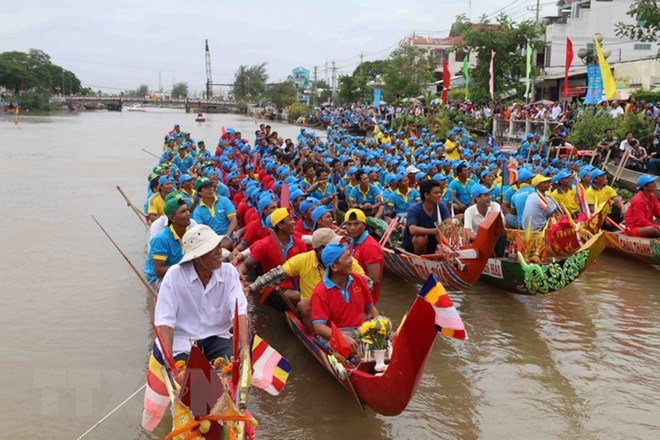
Ooc Om Bok Festival, also called the Festival of Worshiping the Moon, will take place in the Mekong Delta province of Soc Trang from November 16-22, with various activities to celebrate the traditional Khmer festival.
"Ngo" boat race at last year's Ooc Om Bok festival
(Photo: VNA)
A moon-offering ritual, lantern-release ceremony, photo exhibition, Khmer
traditional dance festival and trade and cuisine fair will be held during the
event.
Notably, a "Ngo” boat race - the highlight of the festival - is scheduled for
November 21-22, bringing together 48 teams from Soc Trang, Bac Lieu, Ca Mau,
Hau Giang and Vinh Long provinces.
In addition, there will be a workshop on enhancing local small- and
medium-sized enterprises’ capacity to approach the Fourth Industrial Revolution
(Industry 4.0).
According to Danh Phuong, deputy head of the board for ethnic minority affairs
of Soc Trang province, the event aims to preserve and promote traditional
values of Khmer people while popularising local strengths in economy, culture
and tourism.
Ooc Om Bok is three main festivals, along with Sene Dolta and Chol Chnam Thmay,
that Khmer people celebrate every year. It begins around 7-8 pm on the evening
of 14th of the 10th lunar month when the moon’s position is high in the sky.
Khmer people celebrate at home outdoors or at Khmer pagodas, praying for good
luck, happiness, good weather and bumper crops.
Source: VNA
With an increasingly vibrant and widespread emulation movement aimed at building cultured residential areas and cultured families, Yen Thuy District has been making steady progress toward improving both the material and spiritual well-being of its people, while fostering a civilized, prosperous, beautiful, and progressive community.
Once lacking recreational spaces and community facilities, Residential Group 2 in Quynh Lam Ward (Hoa Binh City) has recently received attention for the construction of a new, spacious, and fully equipped cultural house. The project followed the model of state support combined with public contributions in both labor and funding.
The "All people unite to build cultural life" movement, which has been effectively integrated with Kim Boi district’s socio-economic development goals, is fostering a lively spirit of emulation across local residential areas, hamlets, villages, public agencies, and enterprises. In addition, through the initiative, traditional cultural values are being preserved and promoted, while community solidarity and mutual support in poverty reduction and economic development are being strengthened.
A working delegation of the Hoa Binh provincial People’s Committee led by its Permanent Vice Chairman Nguyen Van Toan on June 11 inspected the progress of a project to build the Mo Muong Cultural Heritage Conservation Space linked to tourism services in Hop Phong commune, Cao Phong district.
Born and growing in the heroic land of Muong Dong, Dinh Thi Kieu Dung, a resident in Bo town of Kim Boi district, in her childhood was nurtured by the sweet lullabies of her grandmother and mother. These melodies deeply imprinted on her soul, becoming an inseparable part of her love for her ethnic group's culture. For over 20 years, this love for her hometown has driven Dung to research, collect, and pass down the cultural values of the Muong people to future generations.
In the final days of May, the Ethnic Art Troupe of Hoa Binh Province organized performances to serve the people in remote, mountainous, and particularly disadvantaged areas within the province. These were not just ordinary artistic shows, but they were the meaningful journeys aimed at spreading cultural values, enhancing the spiritual life of the people and contributing to the preservation of ethnic minority cultural identities.



